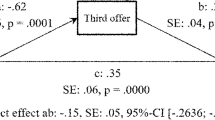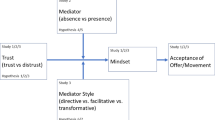Abstract
Although the initial offer is a crucial aspect in the process of most negotiations, there is still a complete lack of empirical evidence on what underpins initial offer decisions. For this reason, the effects of different reference points on the negotiator's initial offer were examined in this study. Results from a sample of 596 managers indicate that knowledge of the opponent's best available alternative, or (Best Alternative To a Negotiated Agreement BATNA), is by far the strongest determinant. Criteria of fairness, as reflected in an estimated market price, are also important. However, awareness of the dependency of the other party has no direct effect on the initial offer. Apparently, negotiators define the negotiation game as the management of interdependency in an extremely egocentric way and base their opening offers largely on cues regarding the power structure within the dyad.
Similar content being viewed by others
REFERENCES
Bartos, O. J. (1974). Process and outcome of negotiation. New York: Columbia University Press.
Bazerman, M. H. (1998). Judgement in managerial decision-making (4th ed.). New York: John Wiley.
Bazerman, M. H., Curhan, J. R., Moore, D. A., & Valley, K. L. (2000). Negotiation. Annual Review of Psychology, 51, 279-314.
Benton, A. A., Kelley, H. H., & Liebling, B. (1972). Effects of extremity of offers and concession rate on outcome of bargaining. Journal of Personality and Social Psychology, 24, 73-83.
Bies, R. J., Lewicki, R. J., & Sheppard, B. H. (1995). Research on negotiation in organizations (Vol. 5) London: JAI Press.
Blount, S., Bazerman, M. H., & Neale, M. A. (1995). Alternative models of negotiated outcomes and the non-traditional utility concerns that limit their predictability. In B. H. Sheppard, M. H. Bazerman & R. J. Lewicki (Eds.), Research on negotiation in organizations (Vol. 5, pp. 95-116). Stamford, Conn: JAI Press.
Blount, S., Thomas-Hunt, M. C., & Neale, M. A. (1996). The price is right-or is it? A reference point model of two-party price negotiations. Organizational Behavior and Human Decision Processes, 68(1), 1-12.
Chertkoff, J. M., & Conley, M. (1967). Opening offer and frequency of concession as bargaining strategies. Journal of Personality and Social Psychology, 7(2), 181-185.
Diekmann, K. A., Tenbrunsel, A. E., Shah, P. P., Schroth, H. A., & Bazerman, M. H. (1996). The descriptive and prescriptive use of previous purchase price in negotiations. Organizational Behavior and Human Decision Processes, 66(2), 179-191.
Donohue, W. A. (1981). Analyzing negotiation tactics: Development of a negotiation interact system. Human Communication Research, 7(3), 273-287.
Fisher, R., & Ury, W. (1981). Getting to yes. Boston: Houghton-Mifflin.
Galinsky, A. D., & Mussweiler, T. (2001). First offers as anchors: The role of perspective-taking and negotiator focus. Journal of Personality and Social Psychology, 81(4), 657-669.
Güth, W., Schmittberger, R., & Schwarze, B. (1982). An experimental analysis of ultimatum bargaining. Journal of Economic Behavior and Organization, 3, 367-388.
Huber, V. L., & Neale, M. A. (1986). Effects of cognitive heuristics and goals on negotiator performance and subsequent goal setting. Organizational Behavior and Human Deci-sion Processes, 38, 342-365.
Huber, V. L., & Neale, M. A. (1987). Effects of self and competitor goals on performance in an interdependent bargaining task. Journal of Applied Psychology, 72, 197-203.
Kagel, J., & Roth, A. E. (1995). Handbook of experimental economics. Princeton: Princeton University Press.
Kahn, R. L. (1991). Organizational theory. In V. A. Kremenyuk (Ed.), International negotiation: Analysis, approaches, issues. San Francisco: Jossey-Bass.
Korobkin, R. (2002). Aspirations and settlement. Cornell Law review, 88(1): 1-61
Kristensen, H., & Gärling, T. (1997a). Determinants of buyers' aspiration and reservation price. Journal of Economic Psychology, 18, 487-503.
Kristensen, H., & Gärling, T. (1997b). The effect of anchor points and reference points on negotiated processes and outcomes. Organizational Behavior and Human Decision Processes, 71, 85-94.
Lim, R. G. (1997). Overconfidence in negotiation revisited. International Journal of Conflict Management 8(1), 52-79.
Ochs, J., & Roth, A. E. (1989). An experimental study of sequential bargaining. American Economic Review, 79(3), 355-384.
Oesch, J., & Galinsky, A. (2003). First offers in negotations: Determinatns and effects. Paper presented at the International Association of Conflict Management Meetings (IACM) 16th Annual Conference, Melbourne.
Pfeffer, P. (1992). Managing with power: Politics and influence in organizations. Boston: Business School Press.
Pillutla, M. M., & Murnighan, J. K. (1996). Unfairness, anger, and spite: Emotional rejections of ultimatum offers. Organizational Behavior and Human Decision Processes, 68(3), 208-224.
Pinkley, R. L., Neale, M. A., & Bennett, R. J. (1994). The impact of alternatives to settlement in dyadic negotiation. Organizational Behavior and Human Decision Processes, 57, 97-116.
Pruitt, D. G., & Carnevale, P. J. (1993). Negotiation in social conflict. Pacific Grove: Brooks/Cole.
Pruitt, D. G. (1981). Negotiation behavior. New York: Academic Press.
Raiffa, H. (1982). The art and science of negotiation. Harvard: Belknap Press.
Riley, H. C. & Robinson R. J. (1999). How high can you go? investigations of the perils and benefits of negotiator optimism. Paper Presented at the Academy of Management, Chicago.
Ritov, I. (1996). Anchoring in simulated competitive market negotiation. Organizational Behavior and Human Decision Processes, 67(1), 16-25.
Shell, G. R. (1999). Bargaining for advantage. New York: Viking.
Siegel, S., & Fouraker, L. E. (1960). Bargaining and group decision making: Experiments in bilateral monopoly. New York: McGraw-Hill.
Thompson, L. (2000). The mind and the heart of the negotiator. (2nd Ed.). New Jersey: Prentice-Hall.
Thompson, L., & Loewenstein, G. (1992). Egocentric interpretations of fairness and inter-personal conflict. Organizational Behavior and Human Decision Processes, 51, 176-197.
Thompson, L., Peterson, E., & Kray, L. (1995). Social context in negotiation: An information-processing perspective. In R. M. Kramer & D. M. Messick (Eds.), Negotiation as a social process:New trends in theory and research (pp. 5-36). London: Sage.
Tripp, T. M., Sondak, H., & Bies, R. J. (1995). Justice as rationality: A relational perspective on fairness in negotiations. In B. H. Sheppard, M. H. Bazerman & R. J. Lewicki (Eds.), Research on negotiation in organizations (Vol. 5, pp. 45-64). London: JAI Press.
Tversky, A., & Kahneman, D. (1974). Judgment under uncertainty: Heuristics and biases. Science, 185, 1124-1131.
Van Poucke, D.,& Buelens, M. (2002). Predicting the outcome of a two-party price negotiation: Contribution of reservation price, aspiration price and opening offer. Journal of Economic Psychology, 23(1); 67-76.
Walton, R. E., & McKersie, R. B. (1965). A behavioral theory of labor negotiations: An analysis of a social interaction system. New York: McGraw-Hill.
White, S. B., & Neale, M. A. (1994). The role of negotiator aspirations and settlement expectancies on bargaining outcomes. Organizational Behavior and Human Decision Processes, 57(2), 303-317.
White, S. B., Valley, K. L., Bazerman, M. H., Neale, M. A., & Peck, S. (1994). Alternative models of price behavior in dyadic negotiations: Market prices, reservation prices, and negotiator aspirations. Organizational Behavior and Human Decision Processes, 57, 430-447.
Wolfe, R. J., & Valley K. L. (2001). Power and process: The role of power balance in negotiation. Paper Presented at the 14th Annual Conference of the International Association of Conflict Management, Paris.
Yukl, G. A. (1974). Effects of the opponent's initial offer, concession magnitude, and concession frequency on bargaining behavior. Journal of Personality and Social Psychology, 30(3), 323-335.
Author information
Authors and Affiliations
Rights and permissions
About this article
Cite this article
Buelens, M., Van Poucke, D. Determinants of a Negotiator's Initial Opening Offer. Journal of Business and Psychology 19, 23–35 (2004). https://doi.org/10.1023/B:JOBU.0000040270.10433.54
Issue Date:
DOI: https://doi.org/10.1023/B:JOBU.0000040270.10433.54




